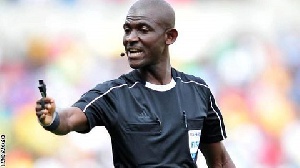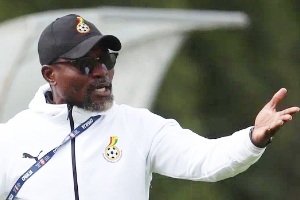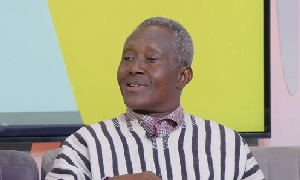For a continent riddled with serious political, social and economic issues, last Saturday’s football match between Ghana and Uganda in Kampala in the African World Cup qualifiers must have been only an important side issue.
Yet, the decisive call by referee Daniel Frazer Bennett of South Africa in denying Ghana victory at the end of an absorbing encounter must have put the spotlight on the continent again.
The goalless draw confirmed the Black Stars’ failed bid to reach a fourth straight World Cup.
What followed – on the field and in the boardroom – demonstrated Ghana’s pain at the raw deal handed the Black Stars by Referee Bennett and his assistants.
Intriguingly, the Ghana Football Association (GFA) lodged an official protest with FIFA within minutes of the end of the game, with reports suggesting that Ghana, among other things, had demanded a replay of the match against Uganda.
Intriguingly, the Ghana Football Association (GFA) lodged an official protest with FIFA within minutes of the end of the game, with reports suggesting that Ghana, among other things, had demanded a replay of the match against Uganda.
Perhaps, the action and the demand by the GFA were motivated by FIFA’s own recent decision to order a replay of the match between South Africa and Senegal following the infamous penalty decision awarded to South Africa by Ghanaian referee J.O. Lamptey who has since been banned for life by FIFA.
Otherwise, it was no more than a face-saving act intended to obscure the reality of Ghana’s shortcomings in the qualifiers. It seemed actually intended to paper over a failure that exposed challenges in technical and administrative areas.
Indeed, Referee Bennett failed to award an obvious penalty when Frank Acheampong was shoved off the ball in the penalty area in the second half and then disallowed the strike that would have given Ghana victory at the last moment.
With the sole ticket in Group E procured by Egypt later on Sunday, the match between Ghana and Uganda had merely an entertainment value for Ghanaians.
The intrigue in the whole protest exercise lies in the posturing of the GFA itself, the body that has effectively looked the other way as domestic football is debased by questionable officiating.
That local football has lost its appeal to the masses is now a cliché. Instead, enthusiasts appear to bury themselves in the European leagues to satisfy their interest and passion.
Among reasons assigned to the ever-growing apathy towards domestic football is the case of consistent bad officiating, the type that appears decided before games.
It is true, however, that even in Europe and elsewhere, there are evidences of bad (or maybe intended biased) officiating at the highest level of the game – even though such cases come in the manner of the odd error.
But there are also examples of stiffer punishment in clear cases of outrageous calls by referees in Europe and elsewhere. Indeed, FIFA’s heavy hammer on Referee Lamptey is a typical example.
Unfortunately, the GFA has looked on with virtual disinterest as referees have reduced local football to a theatre of controversy, with those culprits hardly worried by their shameful output on the field or by the GFA’s slap of their backside – supposed to be punishment.
Unfortunately, the GFA has looked on with virtual disinterest as referees have reduced local football to a theatre of controversy, with those culprits hardly worried by their shameful output on the field or by the GFA’s slap of their backside – supposed to be punishment.
In the many cases that have caused protests in the current domestic league, how many times has the GFA sanctioned a replay when it is obvious a referee’s decision had cost one club or another?Is it not true that charity begins at home?
Is it not true that charity begins at home?Is the GFA concerned that consistently a win is influenced by a referee’s decision rather than a team’s output? Does the GFA bother that a team’s relegation fate, for instance, is sealed by a referee’s decision rather than the team’s performances?
Is the GFA concerned that consistently a win is influenced by a referee’s decision rather than a team’s output? Does the GFA bother that a team’s relegation fate, for instance, is sealed by a referee’s decision rather than the team’s performances?
Currently, Great Olympics are engaged in a battle against relegation. Part of the Wonder Club’s problem has been inflicted by bad refereeing, including the penalty decision that cost them two points against Kotoko in Kumasi.
Currently, Great Olympics are engaged in a battle against relegation. Part of the Wonder Club’s problem has been inflicted by bad refereeing, including the penalty decision that cost them two points against Kotoko in Kumasi.
How can a body that is quick to impose heavy sanctions on clubs when their supporters misbehave be so lenient on the referees whose actions become the excuse for supporters’ misbehaviour?
How can a body that is quick to impose heavy sanctions on clubs when their supporters misbehave be so lenient on the referees whose actions become the excuse for supporters’ misbehaviour?
Is it too difficult to argue that the GFA has forfeited the moral high ground to demand stringent action from a higher authority on a refereeing matter when the same GFA has passively condoned the kind of officiating that brings the game into disrepute?
Is it too difficult to argue that the GFA has forfeited the moral high ground to demand stringent action from a higher authority on a refereeing matter when the same GFA has passively condoned the kind of officiating that brings the game into disrepute?
The anger and pain expressed by the Ghanaian contingent of players and technical officials after Referee Bennett disallowed that goal in Kampala is no different from what local club officials and their supporters feel when bad decisions damage their hopes and aspirations.
The anger and pain expressed by the Ghanaian contingent of players and technical officials after Referee Bennett disallowed that goal in Kampala is no different from what local club officials and their supporters feel when bad decisions damage their hopes and aspirations.
The difference lies in the motivation. Club officials invest their own monies in their clubs and players, and, therefore, are directly pained by efforts that undo them unjustifiably. For the Black Stars officials, the prospect of a winning bonus and a potential financial boom in Russia are possible influencers.
The difference lies in the motivation. Club officials invest their own monies in their clubs and players, and, therefore, are directly pained by efforts that undo them unjustifiably.
For the Black Stars officials, the prospect of a winning bonus and a potential financial boom in Russia are possible influencers. Between the two, the former have a justifiable reason to be agitated, even though the resort to violence has often damaged their case.
Between the two, the former have a justifiable reason to be agitated, even though the resort to violence has often damaged their case. Those who dare to speak up usually endure sponsored assault on the airwaves.
Those who dare to speak up usually endure sponsored assault on the airwaves.
If there was any lesson from Referee Bennett’s decisions of last Saturday, it must be that the GFA must awaken from the state of indifference towards bad refereeing. After all, what is good for club officials in the local league is equally good for the GFA officials in Kampala. Justice is an important life principle that must be availed to all, but it is also true that he who demands equity must come with clean hands!
Justice is an important life principle that must be availed to all, but it is also true that he who demands equity must come with clean hands!
Sports Features of Friday, 13 October 2017
Source: Michael Quaye

















